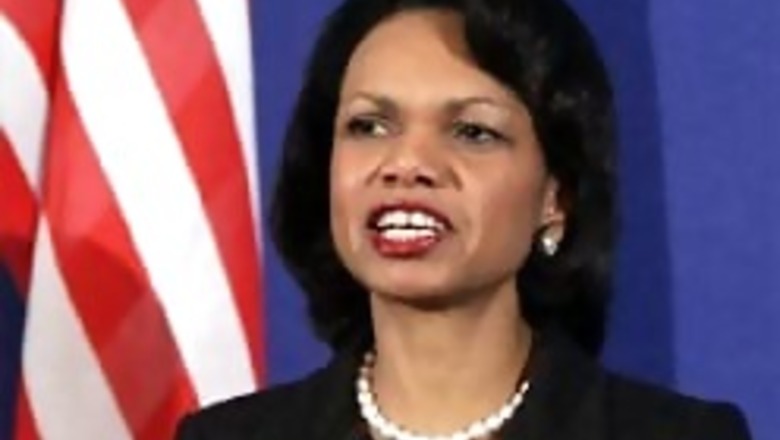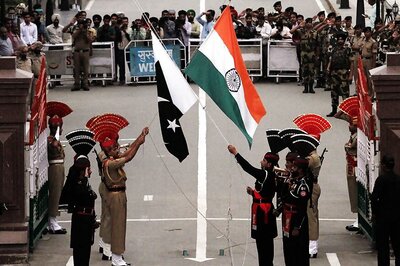
views
Washington: As US President George W Bush urged governments to help quell the violence on Wednesday, his Secretary of State began sparring with the Syrian government over the deadly protests sparked by a series of cartoons depicting the Prophet Mohammed.
As world leaders and the editor of the paper that first published the cartoons speculated over how the violence escalated to a level that killed at least 10 people in different countries, Condoleezza Rice pointed the finger at Syria and Iran.
"Iran and Syria have gone out of their way to inflame sentiments and to use this to their own purposes, and the world ought to call them on it," she said at a joint news conference with Israel's foreign minister, Tzipi Livni.
Although Tehran did not immediately respond, Syria's ambassador to the United States, Imad Moustapha, denied Rice's accusation and tried to turn the blame for the violence on Israeli and US policy decisions unrelated to the cartoon row.
"We in Syria believe anti-Western sentiments are being fueled by two major things: the situation in Iraq and the situation in the occupied territories, the West Bank and Gaza," Moustapha said.
He added, "We believe that if somebody would tell Secretary Rice that Syria is not the party that occupies Iraq and is not the party that occupies the West Bank and Gaza, then probably she would know it is not Syria who is actually fueling anti-Western sentiments."
On Wednesday, the death toll stemming from the violence reached at least 10, as Afghan police shot and killed several of about 600 protesters trying to storm a US military base.
One of the dead in Qalat might be a police officer, eyewitnesses said.
Bush appeared with Jordan's King Abdullah II on Wednesday morning, and both urged leaders in affected nations to step in.
"I call upon the governments around the world to stop the violence, to be respectful, to protect property and protect the lives of innocent diplomats who are serving their countries overseas," Bush said, referring to the attacks on Danish and other European embassies in several capitals.
PAGE_BREAK
Abdullah condemned the violence as well as anything that "vilifies the Prophet Mohammed" and said there was no problem with protesting as long as demonstrators do it "thoughtfully, articulately, express their views peacefully."
Meanwhile, Danish Prime Minister Anders Fogh Rasmussen defended his nation, saying that the Muslim world has the wrong idea about Denmark.
"We are portrayed as a society which is intolerant and an enemy of Islam, and it's a false picture," he said.
However, he said, the Danish government, which has laws against "racist or blasphemous" expressions, has nothing to apologize for.
"I think everybody should realize that neither the Danish government nor the Danish people can be held responsible for what is published in a free and independent newspaper," he said, explaining that anyone seeking redress from a Danish newspaper should turn to the courts.
The cartoons were originally published in September in the Danish newspaper, Jyllands-Posten. But protests against the government itself have increased in intensity in recent days after the reprinting of the caricatures in German, French, Norwegian and Jordanian newspapers.
One of the cartoons showed Mohammed wearing a turban shaped as a bomb.
Moreover, many Muslims consider any depiction of the prophet to be sacrilegious.
The cartoons have prompted boycotts of Danish goods throughout the Muslim world. In Dubai, United Arab Emirates, travel agents said travelers were not booking flights to Denmark or Norway.
Also in UAE, a university professor was fired after distributing copies of the cartoons to her students. The nation's minister of education, Sheikh Nahyan bin Mubarak al Nahan, said he ordered Clauda Keepoz's dismissal because "her behavior has nothing to do with the freedom of expression."
In France, President Jacques Chirac asked the media to avoid offending people's religious beliefs and condemned "obvious provocations."
Belgian Foreign Minister Karel De Gucht, chairman of the Organization for Security and Co-operation in Europe, also urged an end to the violent protests and called for a balance between free expression and respect for religion and culture. He added that the nature of the cartoons "cannot and does not legitimize violence."
"The press should decide in a responsible way what it publishes," he said. "Although states might not subscribe to the content of media publications, it is not up to governments to influence the content of the press.
Iraqi national security adviser Mowaffak al-Rubaie said he didn't agree with publishing the cartoons. However, he said he also disagreed with extremists using the cartoons to stir up violence "against the Western interests and actually against the good reputation of Islam as a religion, of Muslims as a people, as a peaceful people, and people believing in freedom of speech."
But Flemming Rose, cultural editor of Jyllands-Posten, said he didn't believe there was "a direct linkage" between the publication of the cartoons in September and the eruption of protests this month.
The real violence began only after a group of Danish Muslim leaders, or imams, went to the Middle East and exaggerated the situation, "trying to ignite public opinion against Denmark, did all these tragic events start to unfold," he said.
"I think it is a tragedy," he said. "And I do think these cartoons are not worth a single human life."




















Comments
0 comment